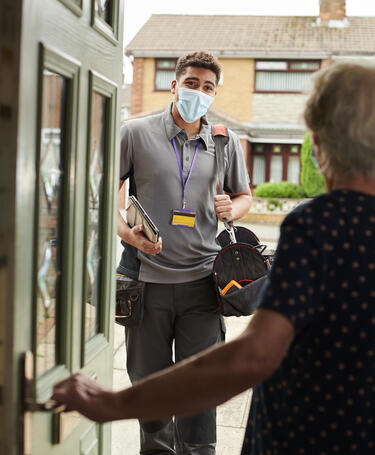
Keeping quality at the heart of care and support services

When the Covid-19 pandemic hit the UK, Ability Housing Association had to work out how to keep its residents safe – and make them feel safe, as CEO Jeff Skipp explains.
Ability Housing Association provides 20 housing, care and support, and community-based services for around 500 people across the south and south-east of England, for people who want to live as independently as possible.
Measuring care quality
Excellent customer service is essential to the management and delivery of our services, so we benchmark ourselves against rigorous quality requirements and other measures, to ensure we are delivering the best possible care.
This starts with meeting statutory obligations such as the fundamental standards of the Care Quality Commission, which we are audited against each year, keeping up to date with new landlord-focused legislation, and providing a value-for-money service.
Internally, Ability has a list of metrics, and managers submit weekly reports, tracking support levels and staffing input, including any absences, incidents recorded and actions needed.
Every resident has a personal support plan, including risk assessment, staffing required and specific outcomes. We monitor everyone to keep them on track with this, liaising with the local authorities paying for the services and other stakeholders.
Our area managers audit each service on a quarterly basis and we, in turn, provide a quarterly return to our board of trustees.
Beyond this, Ability’s ‘Q Team’ – a group of residents who ‘test drive’ our services – give us feedback on their experiences, so we can improve what we do further. We also run an annual survey to measure how satisfied customers are with the quality of their home, repairs and overall service.
Adapting hands-on services
Many of our services require proximity to our customers, and the pandemic challenged us do this while minimising the risk of infection to them, our staff teams, and contractors, while keeping the quality of our service high. We had to reduce provision of certain services temporarily, while we increased others.
When the first national lockdown was announced on 23 March last year, we immediately refocused our repairs service to attend to emergency and urgent repairs only, as well as essential landlord health and safety inspections, such as gas servicing. When it was necessary to enter residents’ homes, they worked with our staff and contractors to get repairs carried out in a way that kept them safe.
Excellent customer service is essential to the management and delivery of our services, so we benchmark ourselves against rigorous quality requirements
At the same time, we stepped up contact with residents where we could. We introduced weekly wellbeing calls to give everyone the support they needed from the outset. We maintained these throughout the year for residents who wanted the regular contact. We also continued estate inspections to ensure our housing and estates were safe, and that we identified any emerging health and safety issues.
Meanwhile, we brought forward our fire risk assessments by external contractors to ensure all necessary fire-safety precautions were in place for residents, many of whom would be spending more time at home than they would under normal circumstances.
Within our Care & Support services, our priority was to prevent Covid-19 from taking hold. This involved implementing difficult and challenging rules prohibiting visitors, closing communal areas, and introducing strict social distancing and infection-control procedures. This was challenging for residents and had an impact on so many of the people we serve. Our staff played an important role in mitigating the impact of this change.
Our employees worked with residents and, within government guidance, arranged and supported activities such as walking, board games, cooking in groups, and others. They also helped residents in supported housing services form bubbles, with the aim of minimising isolation.
Keeping standards high
With staff contact with our residents severely limited, and Ability’s Q Team unable to operate, our capability to deliver quality services and measure them was challenged.
As the pandemic hit, we followed evolving government guidance closely, analysed what it meant for Ability, and communicated weekly updates to staff. This included the latest health and safety advice, protocols on PPE, and amendments to existing guidelines. Ensuring we all followed this advice was essential to keeping our people safe and services running to a high standard – despite the delivery of those services changing.
Covid meant we couldn’t move staff between services as we could before, so we worked with customers and local authorities to agree reduced levels of service where necessary – while ensuring they were still safe.
Meanwhile, with up to 30 per cent of staff off because they were self-isolating or infected, we had to reach guaranteed-hours deals with agency staff (government Covid social care payments helped us achieve this), in return for assurance that the staff they provided wouldn’t work in other services while the pandemic was ongoing.
To keep track of an extremely fluid situation with regards to staffing, we increased our monitoring – covering, on a GDPR-compliant basis, employee absences and tenant infections daily.
The pandemic presented a severe challenge to the provision of high-quality care to our customers, but actions – including those listed above – helped mitigate some of the effects. When we ran our annual customer satisfaction survey, while some residents in community-based services reported feeling less safe (something we are currently addressing), 92 per cent said they were happy with the support they have received during this difficult year.